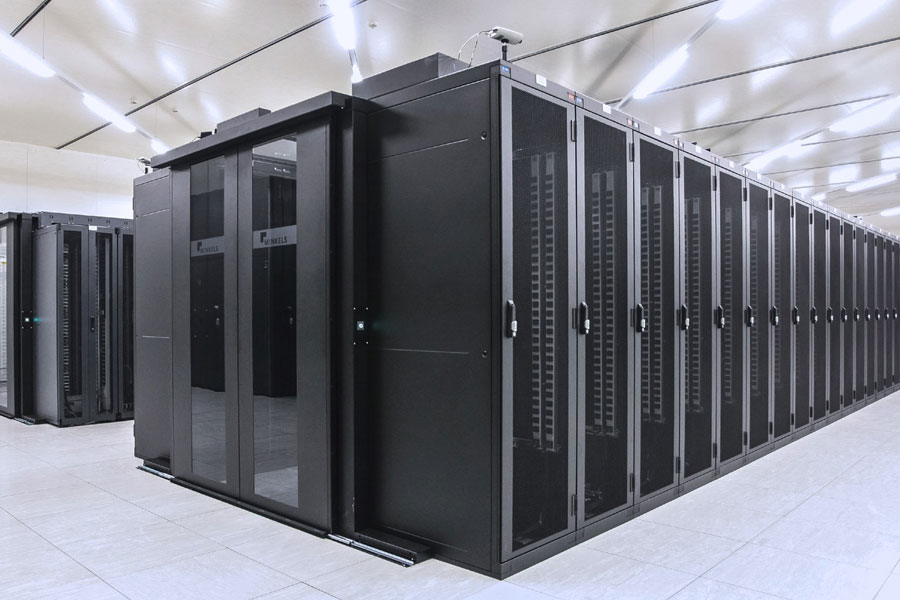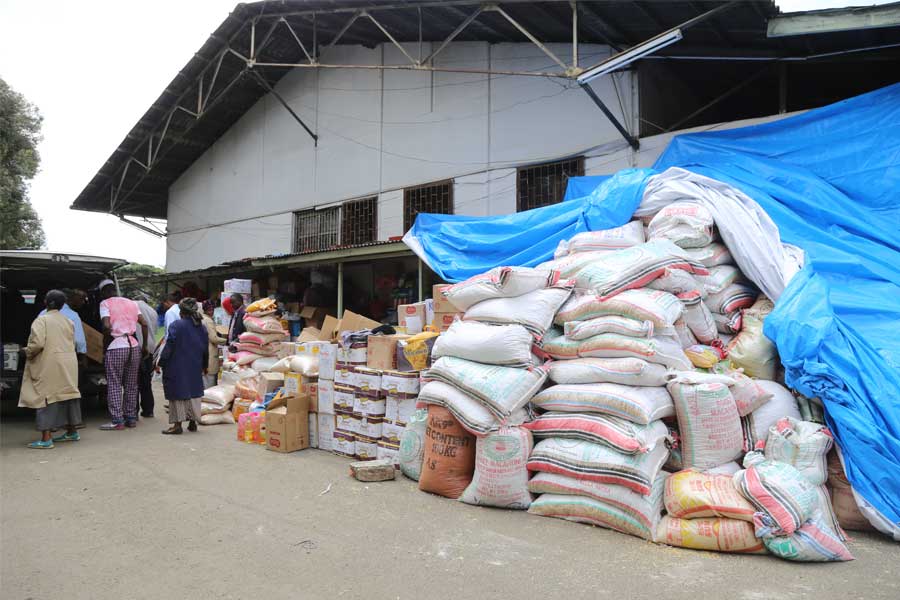
Fortune News | Mar 26,2022
For the past four months, all of the campuses of Rift Valley University were empty with almost no activity. The campuses used to be very busy with students rushing to go to class or leaving the compound, while others goofed off with their peers, giving a vibrant mood to the premises.
This is no longer the case. Most of the campuses are empty with classes suspended for the time being.
The compounds emptied out following the closure of schools in mid-March as part of preventive measures against the spread of Novel Coronavirus (COVID-19). The University is teaching students via internet-based platforms to comply with physical distancing measures.
It closed all of the campuses in the capital, except for its head office located in Gotera on Sierra Leone St. It furloughed half of its employees and supplied them with sanitiser, face masks and gloves. But the supply of personal protective equipment was not enough.
Currently, 120 staff are working at the head office, which is still full of people and students who come to submit their assignments and receive other document-related services.
This continued activity at the head office triggered the management to disinfect the entire office, according to Tigist Reta, head of administration and finance at the University.
For the disinfection service, the University hired Ethioairs Trade & Investment early this month. Ethioairs disinfected the five-storey building, every office with its equipment and the entire premises, for 25,000 Br.
While hitting hard most of the manufacturers and suppliers, the pandemic has created a business opportunity for some companies, including manufacturers of sanitiser and face masks, delivery businesses and video conferencing websites.
Globally, companies such as Amazon, Zoom and Netflix have seen enormous and unprecedented user growth and revenues during the pandemic. Video conferencing firm Zoom earned 328 million dollars from February to April 2020, a 206-million-dollar increase from the same period last year.
While such high flyers capitalised on increased demand for their primary tech platforms, many non-tech companies in Ethiopia have had to reinvest in new business segments, since their main revenue streams have deteriorated.
Established 13 years ago, Ethioairs has been engaged in tour and travel, event organisation, training and employment, and advertisement and promotion services. However, it tailored itself to a new business following the COVID-19 slowdown.
After the first COVID-19 case was reported in Ethiopia, the management of the company decided to close its doors for 15 consecutive days, according to Betelhem Tadesse, the owner of Ethioairs.
Banks are using germicidal, cash-counting machines imported by ETCON.
The management believes that it cannot stay in business by closing its doors for an extended period of time, but decided to venture into another business as a means to stay afloat. The business that the company decided to join is disinfection service.
“We understood there is a massive demand for the service,” said Betelhem.
After allocating two million Birr in start-up capital and procured machinery, the company applied for a license from the Food & Drug Authority to secure a permit. It then acquired a temporary service for half a year. So far, the Authority issued permits to 14 companies engaged in disinfection and cleaning services, and over 40 companies are waiting to secure the license.
Currently, there are 449 personal protective equipment importers and 159 sanitiser manufacturers in the country that have secured temporary licenses from the Authority.
Since its establishment, Ethioairs has provided service to over 670 institutions in the capital. It is now manufacturing the chemicals utilised for disinfection.
“We're providing services to 18 to 20 institutions a week across the country,” Betelhem told Fortune. “We've also signed contracts with many private and public institutions to disinfect their premises constantly.”
Founded in the capital, Ethioairs recently branched out to Adama, Meqelle, Bahir Dar, Modjo, Sodo, Dessie and Bishoftu.
“We'll be opening new branches in Dire Dawa and Harar soon,” Betelhem told Fortune.
The company is now dealing with the Addis Abeba City Administration to venture into another seasonal business in opening an isolation centre in the capital, according to Betelhem.
Not only Ethioairs but also Ethiopian Trade Contacts Plc (ETCON), which has been engaged in the import of building products, banking automation devices and academic books for the past two decades, was forced to divert into a new business segment to remain afloat.
Over the years of its existence, the company has imported different items from Europe, the United States and Asia.
After the pandemic imposed severe disruption on the supply chains of ETCON along with the existing problems in the economy, such as the chronic forex crunch, according to Yazew Bekele, managing director and co-owner of ETCON.
“For the last three years, we've been struggling to stay vigilant due to the hard currency crunch,” Yazew said. “We couldn’t import as many commodities as we wanted.”
ETCON, which has been selling 2,000 to 3,000 units of bank equipment a year, turned its face to import germicidal, ultra-violate cash counting machines. It imports the germicidal cash counters from Taiwan.
ETCON, which mobilised 20 million Br in capital, used to act as the third party in the trade channel that distributes SCAN COIN’s brand of cash counting machines, which is the distributor of True Trust International Co, Ltd, the original manufacturer of banknote counters. The manufacturer supplied SCAN COIN machines based in Europe and MAGNNER based in the United States with the cash counting machines.
Two weeks ago ETCON secured a deal to be a direct distributor of True Trust International and will directly purchase from the equipment manufacturer located in Taipei. Miranda Lee, communications manager of True Trust, confirmed to Fortunethat ETCON had become their direct distributor.
“The seasonal market opportunity has encouraged us to be a direct purchaser and distributor from the company,” said Yazew.
The market for the newly introduced germ sterilising cash counter is very encouraging, according to Yazew, who adds that the businesses and financial institutions are becoming very interested in buying the germicidal bill counting machines.
The company is now planning to import products with new features and innovations because of the huge market opportunity, according to the managing director.
Established by five members of Yazew's family with a registered capital of 50,000 Br, the company has so far imported over 2,000 germicidal lamps for different buyers.
The COVID-19 pandemic has inflicted unbearable damage on most of the companies in the capital, leading them to struggle for survival with the drying up of their revenues and the lockdown of their customers.
MTS Trading Plc is another business that obtained a temporary license for a disinfection service. TMS, which was established in 2016, has been providing cooling maintenance and cleaning services for brewery firms that have declined amidst the pandemic.
MTS, which operates with 130 employees, uses eight different chemicals for disinfection, according to Tomas Alemayehu, general manager at the company.
Businesses in the hospitality sector are the major customers of these disinfection services, according to Tekie Alemu, associate professor of economics at Addis Abeba University.
"It has become a marketing strategy in order to help customers have confidence," said Tekie.
The companies are essential to the domestic economy in terms of production sufficiency to local demands, according to Tekie.
“Thus, the government should support these new businesses by availing working capital, inputs and hard currency to them,” recommended Tekie.
The Ethiopian Hotel Marketing Association, which has 152 member hotels, also recently prepared a manual for disinfection services. The manual recommends that the hotels regularly disinfect their premises as a standard with chemicals that are enumerated by the World Health Organisation. The manual outlines nine chemicals to be used, and most of the disinfection service providers are using them.
“We've obtained a license to give regular disinfection services to the members and other institutions,” Getahun Alemayehu, president of the Association's board, told Fortune.
The Association was provided with a license by the Food & Drug Authority to give disinfection services for free, since the members make an annual contribution to fees. To provide the service to member hotels, the Association is now spending around 80,000 Br a month.
“We're looking for arrangements that we can provide disinfection services to non-member institutions with payment,” said Getahun.
Tekie, the expert, argues that these businesses should also repurpose their production according to the demands of the market.
“The government should work toward import substitution to satisfy local demand by assisting businesses to produce the commodities they are importing at the moment," he said.
However, the users of these services seem to be determined to stay customers of these companies until COVID-19 is over.
The management of Rift Valley University is planning to disinfect the head office at least once a month, according to Tigist.
Oromia International Bank, which grossed 1.1 billion Br during the recently ended fiscal year, is disinfecting its head office every week to prevent the pandemic.
The Bank hired Ethioairs to constantly spray its branch offices, which are crowded and anticipated to be highly susceptible to the spread of the pandemic, according to Belay Bayisa, head of strategy and business development at the Bank.
PUBLISHED ON
Jul 25,2020 [ VOL
21 , NO
1056]

Fortune News | Mar 26,2022

View From Arada | Jan 21,2023

Fortune News | Dec 19,2021

Fortune News | May 17,2025

Fortune News | Sep 08,2019

Radar | Jul 13,2019

Editorial | Mar 13,2021

Radar | May 02,2020

Fortune News | Aug 29,2020

Agenda | Nov 02,2019

Dec 22 , 2024 . By TIZITA SHEWAFERAW
Charged with transforming colossal state-owned enterprises into modern and competitiv...

Aug 18 , 2024 . By AKSAH ITALO
Although predictable Yonas Zerihun's job in the ride-hailing service is not immune to...

Jul 28 , 2024 . By TIZITA SHEWAFERAW
Unhabitual, perhaps too many, Samuel Gebreyohannes, 38, used to occasionally enjoy a couple of beers at breakfast. However, he recently swit...

Jul 13 , 2024 . By AKSAH ITALO
Investors who rely on tractors, trucks, and field vehicles for commuting, transporting commodities, and f...

Oct 18 , 2025
The political establishment, notably the ruling party and its top brass, has become p...

Oct 11 , 2025
Ladislas Farago, a roving Associated Press (AP) correspondent, arrived in Ethiopia in...

Oct 4 , 2025
Eyob Tekalegn (PhD) had been in the Governor's chair for only weeks when, on Septembe...

Sep 27 , 2025
Four years into an experiment with “shock therapy” in education, the national moo...